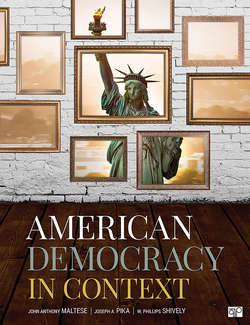Читать книгу American Democracy in Context - Joseph A. Pika - Страница 46
На сайте Литреса книга снята с продажи.
Consequences for Democracy
ОглавлениеDoes it matter that the United States is a democracy with a strong emphasis on individual self-reliance and freedom? This may seem a strange question to ask. It is hard to imagine the United States being anything else, and the word democracy so purrs with respectability that it is a little hard to take the question seriously. Nonetheless, it is worth raising the question. After all, relatively few countries in the world have been democracies consistently for even the last few decades. As we saw, fewer than a third of the world’s countries were democracies in 1977.
What would be different about the United States if it were not a democracy? Though it is difficult to speculate about such a broad question, there are some things we can probably conclude from comparisons with other countries. First of all, the United States would probably be just as prosperous if it were not a democracy. Most analyses of democracy and economic growth have concluded that it does not make much difference to the prospects for economic growth whether a country is democratic or not.22 And we can see from many examples, such as China or Singapore, that a country can grow and prosper even though it is not a democracy.
Though democracy is not the source of countries’ prosperity, however, it does affect how the fruits of that prosperity are distributed. In general, democracies are better than non-democracies at responding to the broad needs of their people. This makes sense, since in a democracy, the government is accountable to all of the people. A review of the well-being of people in democracies and in non-democracies concluded that democratic governments’ policies in health and other areas were sufficiently better than those of nondemocratic governments that people in democracies had life expectancies that were three or four years greater than in non-democracies.23 We can assume from this that if the United States were not a democracy, various policies of the government would be significantly less helpful to the broad range of people in the country.
But there is much more to it than this. In country after country around the world in the 1970s and 1980s, as people established democracy in their countries, they did not do it to improve their living standard or their health but because of deep aspirations for human dignity. The basic appeal of democracy is the individual dignity it confers on each citizen by giving him or her a small share of the power of government, and the protection its rule of law offers against arbitrary acts by the government. These are the values behind the movement toward democracy in other countries in the twenty-first century. And as we have seen, they are values deeply rooted in the American culture. Probably the greatest difference democracy makes to Americans is that it fulfills those values.
